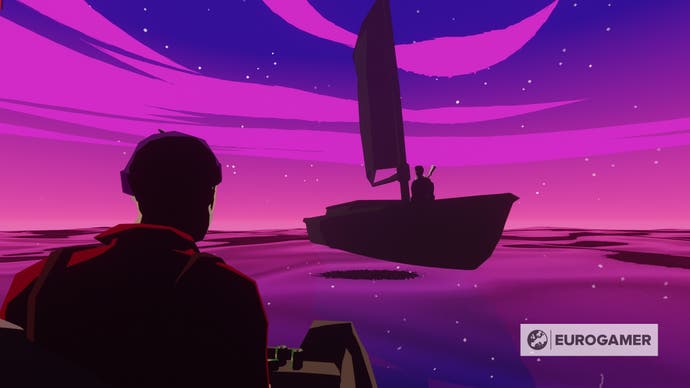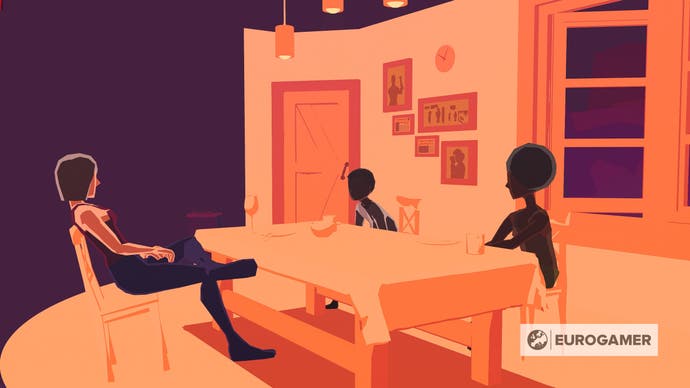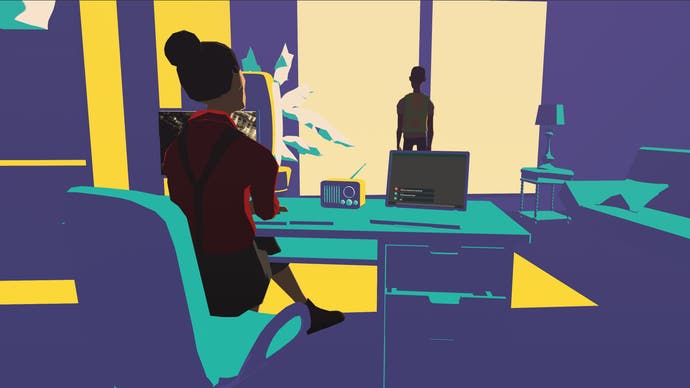The Sacrifices show games can take on politics, and it's so refreshing
Goodbye set-dressing, hello discussion.
I'm a night fisherman bobbing up and down on the open sea. Suddenly, a larger boat appears from the darkness alongside me. The younger man on board hails me. I can see the butt of a shotgun protruding from his back. "Haven't seen any immigrants out here, have you?" he asks me (words to that effect). "Only, we've had reports..."
The thing is, I have.
*
I'm a retired cartoonist sitting at my table with my partner and someone else: a boy - a boy who we just hit with our car. He's OK, thank god, but he cannot be here. He's not allowed to be here. We're supposed to hand people like him over to the authorities. If we don't, we could go to jail.
Outside the window, unseen by us, silhouetted figures approach.
*
I'm a lady behind a desk, in a room high up in a block overlooking central London. There are big protests below. The man in the room with me, looking out of the window, is coordinating them. I'm running comms. We want to keep things civilised but troublemakers, who appeared out of nowhere, are causing problems.
The police are advancing. We're hemmed in.
*

What do you do? It's the same question in all of these scenarios. You're in someone's skin as they make one of the most important decisions of their life. Do you tell the truth on the water? Do you give the boy in the car accident up? Do you charge the police?
Whatever you decide, the consequences ripple through the scenarios after. They're all linked. They all revolve around one common theme: that boy, that man. One person, a refugee called Adi. But more specifically, the revolve around the attitudes in Britain towards him, and beyond that, the attitudes of the world.
That's unusual to hear. We're not used to games being openly political. Usually, PR people run the other way screaming "we're not political! we're not political!" in an effort to avoid controversy and confrontation. But these games intentionally court them. These games are directly inspired by the inhumane treatment of immigrants arriving in the UK over the past year. They're directly inspired by the unbelievable US presidential election, by the Black Lives Matter protests, by the Hong Kong protests - by every protest which erupted this year. These are games designed to make us think about these things.
"In games, generally, saying anything political is taken as a bad thing by a big part of the audience," Anthony de Fault, one of the games' two key creators, tells me. "And you end up, realistically, with masses of entertainment that say absolutely nothing and, at best, use political things as set-dressing."
He not only wants games to address these issues but behave like calls to action within them. "There's been stuff that has done that for me," he adds. "It needed to slap me and say, 'Fucking get off your ass and go and do something about it.' That's what I want the games to do."

The idea materialised after GDC was cancelled in the first wave of the coronavirus pandemic, in March this year. De Fault and business partner Richard Tongeman were headed there to pitch a different game to publishers but never got the chance. Prospects evaporating, the pair pivoted to something else, something they knew, something they could knock up quickly and simply in roughly a week.
The tech they'd made for their noir detective game Ring of Fire (inspired by de Fault's own troubled background) meant they had usable tech and a template for telling a story in. All they needed was a theme. Cue UK politics and Priti Patel repelling immigrants with a newly appointed naval Clandestine Channel Threat Commander. The Night Fisherman - the first of the scenarios I described above - was born.
It got good feedback so they polished it up and released it. The whole thing took about a month. What they didn't expect was their little game to become a focal point for Itch.io's enormous Bundle For Racial Justice, created in the wake of George Floyd's death. "It seemed to resonate with someone who was curating it, and they gave it - out of the 8000 games or whatever [in it] - they gave it the number one spot on the page." The result was an enormous spotlight turned on the game. "We got a ridiculous amount of exposure. We had, like, 30,000 people on the game."
Almost overnight they went from "toiling away in the darkness" to having people declare their love for the game and idea. So they quickly put out a follow-up game, The Outcast Lovers - the second of the scenarios described above - while a bigger idea started to form in the background. What if they made these into a series?
Contractual obligations for their year of Northern Ireland Screen funding meant they had to finish another game, The Imagined Leviathan - a black and white detective game set in post-climate change Britain - first, but once that was done, The Sacrifices was born. It was to be a collection of seven games to revolve around the character Adi.
Each game would be made in a month and focus on current affairs. But they'd need help to make them a reality. They'd need audio help, production help, sensitivity consultancy help to ensure they portrayed a refugee's experience authentically. So they went to Kickstarter and sought £10,000.

Sadly, they didn't make their goal. Not yet, anyway. The Kickstarter deadline expires several hours from now and they're still £7000 away from their target. They released the third game in the series last week - The Change Architect - but it was drowned out by the UK launch of PlayStation 5.
Sadly, if they don't reach their goal, that's that for The Sacrifices. I spoke to de Fault again yesterday and he said "we've made the decision that without the Kickstarter funding, we won't be able to do The Sacrifices right". "Further," he added, "there obviously just isn't the audience we hoped for." What seemed like huge interest from the Bundle for Racial Justice just didn't convert on Kickstarter.
I think that's a shame. The games are well put together. The art is striking, the writing punchy, and there's an eye for cinematic flair and tension. They might only be 10 minutes long but they leave a much longer, lasting impression. And that's the point, to be thought-provoking.
Imagine these games used in classrooms as jumping-off points for deeper discussions on immigration and racial inequality, or used to talk about the merits of protesting, or the myriad other issues the games touch on. Because by giving you decisions to make, The Sacrifices make you think. They make you think about the contexts your decisions exist in, and therefore the wider issues they're linked to. It's a unique power that interactive experiences like this have.
On the other hand, maybe Kickstarter isn't the right place for something like this. Maybe it needs entirely funding by an Arts Council or a Northern Ireland Screen, rather than trying to appeal to the public for help.
Whatever the reasons, it's frustrating, and now I'm left a bit confused about what to think. On the one hand, Far Few Giants has had a small stroke of fortune in that The Imagined Leviathan, the black-and-white existential horror game, has been gaining in popularity so the team can now pivot to working on that. But on the other hand, it feels like the exciting political voice it tried out in Ring of Fire, then blurted out in The Sacrifices, has somehow found itself silenced in gaming again. I just hope it's not lost forever.
The Night Fisherman, The Outcast Lovers and The Change Architect are all available now, to play for free with the option of donating, on Itch. There's also a a nice podcast called In the Footsteps of Giants that follows the escapades of Far Few Giants through its year of Northern Ireland Screen funding.

